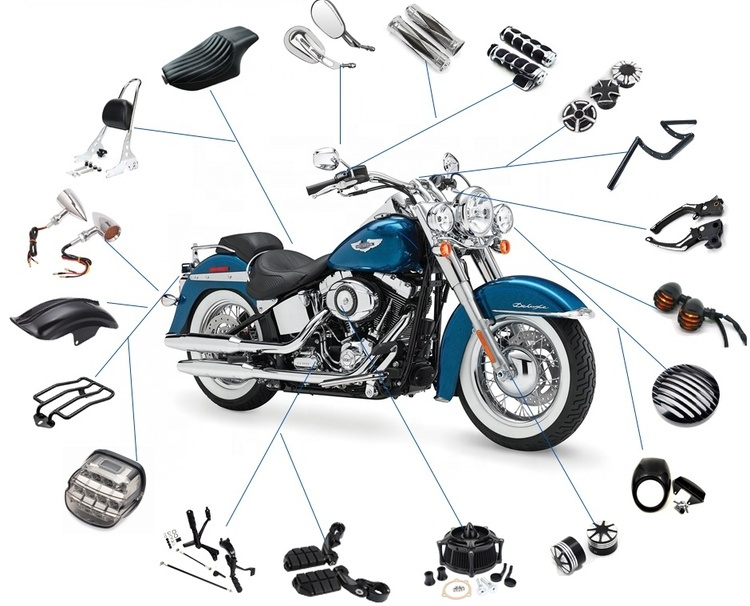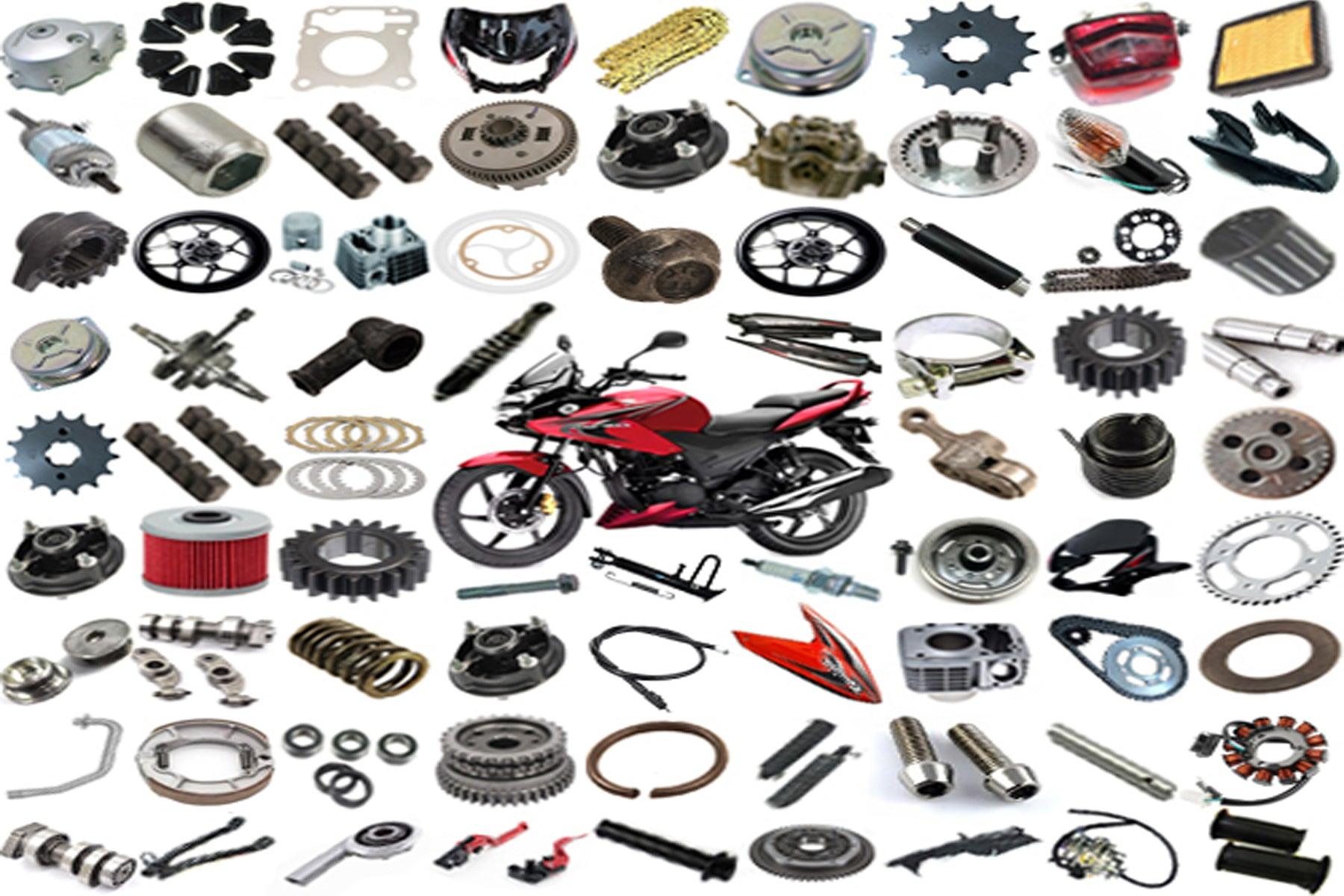Discover the Important MotorBike Components You Need for Ideal Efficiency
Recognizing the important parts of a motorbike is essential for attaining peak efficiency. Each component, from the engine to the braking system, plays a crucial duty in overall performance and safety and security. Regular maintenance can stop unanticipated failings and boost the riding experience. Lots of cyclists overlook the intricacies of these systems. Discovering how they work together can result in a much more effective experience. What vital parts should every cyclist focus on?
The Engine: The Heart of Your Motorbike
The engine works as the core element of a motorbike, driving its performance and defining its capabilities. It is responsible for transforming gas right into power, which powers the bike ahead. Different kinds of engines are employed, including single-cylinder, V-twin, and inline arrangements, each offering distinctive features fit for different riding purposes and styles. The engine dimension, generally determined in cubic centimeters (cc), significantly influences performance, with bigger engines normally offering more power and torque.Furthermore, the engine's layout and modern technology, such as fuel injection systems or air-cooling versus liquid-cooling, influence effectiveness and dependability. Upkeep is crucial for peak procedure; elements like normal oil modifications and checking trigger connects guarantee long life. Motorcyclists frequently consider an engine's responsiveness and level of smoothness, as these characteristics boost the general riding experience. Ultimately, the engine continues to be a vital element that specifies not only the motorcycle's efficiency but additionally the biker's link to the device.
The Transmission: Changing Gears Smoothly
The transmission plays a crucial function in a motorcycle's performance, especially in the technicians of gear moving. Understanding exactly how to change gears efficiently can enhance the overall riding experience, while normal upkeep assurances peak performance. Correct attention to these aspects can substantially affect the long life and efficiency of the motorbike.

Equipment Shifting Mechanics
Smooth equipment shifting is necessary for optimal motorcycle performance, considerably influencing both acceleration and control. The auto mechanics of equipment changing involve the interaction in between the clutch, equipment bar, and transmission system. When a biker involves the clutch, it disengages the engine from the transmission, permitting an equipment adjustment without damaging the components. A well-timed launch of the clutch, integrated with accurate movement of the equipment bar, facilitates a seamless modification in between equipments. This procedure guarantees that the engine operates within its best power band, improving efficiency. Motorcycle Spares Christchurch. Additionally, understanding the gear ratios and their impact on speed and torque can help motorcyclists make informed options during shifts, eventually adding to a much more receptive and satisfying riding experience
Upkeep Tips Relevance
Regular upkeep plays a necessary duty in assuring that the transmission system runs effectively, enabling for smooth gear shifts. Routinely transforming the transmission and inspecting fluid is important, as old fluid can lead to increased rubbing and wear. Furthermore, checking the clutch for wear assurances peak involvement and disengagement, stopping slippage throughout gear adjustments. Lubrication of relocating parts is equally vital to minimize friction and boost efficiency. Motorcycle proprietors must likewise monitor for leakages and unusual sounds, as these can suggest underlying issues. By sticking to these maintenance tips, cyclists can extend the life expectancy of their transmission system, guaranteeing that equipment shifts remain smooth and adding to the overall efficiency of their motorbike.
The Braking System: Ensuring Safety And Security on Every Adventure
Braking systems are essential parts that straight affect a motorbike's safety and security and performance. They include various components, including brake pads, blades, calipers, and hydraulic lines, all collaborating to ensure reliable deceleration. The sort of braking system-- typically either disc or drum-- influences responsiveness and stopping power.Regular maintenance is essential to promote peak performance; worn brake pads can bring about reduced performance and enhanced quiting distances. Furthermore, the quality of brake fluid need to be kept track of, as it can soak up moisture gradually, endangering braking efficiency.Riders must additionally think about the relevance of anti-lock stopping systems (ABS), which avoid wheel lockup throughout sudden stops, improving total safety. Correctly operating brakes are not just concerning quiting; they instill confidence in the motorcyclist, permitting safer navigation with different surfaces. Inevitably, a dependable braking system is vital for enjoying every adventure with peace of mind.
The Suspension: Enhancing Convenience and Control
A well-functioning suspension system substantially adds to a motorcycle's general efficiency, enhancing the efficiency of the braking system. The suspension plays a significant duty in soaking up shocks from unequal surface areas, assuring a smoother experience while maintaining tire contact with the roadway. This call is vital for both stability and control, enabling cyclists to navigate corners with confidence and precision.Different sorts of shock absorber, such as telescopic forks or mono-shocks, supply differing degrees of comfort and handling. Correctly tuned suspension boosts responsiveness, supplying the biker with a more linked feel to the motorbike. Normal maintenance checks are necessary to determine the suspension components, consisting of springtimes and dampers, are working at their best. A reliable suspension system not just raises the riding experience but likewise adds to the long life of other motorcycle parts by decreasing deterioration. Because of this, investing in top quality suspension is crucial for any significant motorbike lover.
The Tires: Connecting You to the Roadway
Tires play an important duty in a motorbike's performance, working as the primary web link in between the road and the motorcyclist. Recognizing the different sorts of tires readily available can significantly influence dealing with and safety and security. In addition, regular upkeep is essential to guarantee peak tire performance and durability.
Tire Keys In Explained
How do different tire types affect a motorcycle's performance? Tire types play an essential function in establishing a motorbike's handling, stability, and grip. Sport tires, created for high efficiency, deal improved traction and responsiveness on smooth roads, making them excellent for competing and aggressive riding. On the other hand, visiting tires focus on durability and comfort, offering a smoother trip for long-distance travel. Off-road tires, defined by their tough walk patterns, stand out in grip on unpaved surface areas, appropriate for experience lovers. Furthermore, dual-sport tires blend characteristics from both on-road and off-road classifications, dealing with versatile riding needs. Ultimately, picking the appropriate tire kind is crucial for maximizing efficiency, making sure security, and improving the overall riding experience.
Maintenance Tips Offered
While riding when driving, preserving optimal tire condition is vital for safety and security and efficiency. On a regular basis checking tire stress is vital, as under-inflated tires can cause poor handling and increased wear. It is suggested to check tread deepness often; worn tires concession grip and security. In addition, riders need to search for indicators of damages, such as lumps or fractures, which can show the requirement for replacement. Turning tires regularly ensures even use, improving durability. Maintaining tires clean from debris and staying clear of excessive aesthetics can prolong their life-span. Finally, keeping proper placement and balance adds to come to a head performance, decreasing anxiety on various other bike elements. Following these upkeep tips will considerably boost the overall riding experience.
The Fuel System: Sustaining Efficiency and Efficiency
The fuel system plays a crucial duty in making best use of a motorbike's performance and efficiency, as it guarantees the optimum delivery of fuel to the engine. It check these guys out comprises a number of critical elements, including the gas container, gas pump, gas filter, and fuel injectors or carburetor. Each part should work successfully to assure a powerful and smooth ride.The fuel tank stores gasoline and supplies it to the engine through the gas pump, which creates the essential stress. A gas filter prevents contaminants from entering the engine, while the injectors or carburetor mix fuel with air for combustion.Proper maintenance of the gas system is crucial; a blocked filter or malfunctioning injector can result in reduced efficiency and boosted gas consumption. By confirming that the fuel system runs successfully, cyclists can appreciate better throttle feedback, far better gas economic climate, and generally improved riding experience.
The Electrical System: Powering Your Ride
A reliable electric system is necessary for the general performance and safety of a motorbike, as it powers essential parts such as the ignition, lighting, and numerous electronic systems. This system includes the battery, which shops energy, and the alternator, in charge of creating power while the engine runs. The electrical wiring harness links these components, ensuring reliable power distribution.Additionally, integrates shield the system from overloads, while relays assist control high-current tools with low-power signals. A well-maintained electric system improves performance by making sure smooth starts and regular operation of lights and signals, essential for biker visibility and safety.Regular checks of the battery's fee and connections are essential for stopping electrical failings. Cyclists must also check wiring for deterioration, making certain all parts work preferably. Eventually, a durable electrical system contributes considerably to the general performance and dependability Full Report of the motorcycle.
Often Asked Questions
Exactly how Frequently Should I Replace My Motorbike's Battery?
The frequency of motorbike battery replacement depends upon usage and upkeep (Motorcycle Spares Christchurch). Typically, batteries need to be replaced every 3 to 5 years. Regular checks can assist identify when a replacement is needed for peak efficiency
What Tools Do I Need for Fundamental Bike Upkeep?
For basic motorcycle maintenance, one needs essential tools such as a socket set, wrenches, screwdrivers, pliers, tire pressure scale, and a torque wrench. These devices promote effective upkeep and guarantee the motorbike runs effectively and securely.
Exactly How Can I Boost My Motorcycle's Aerodynamics?
To improve motorbike aerodynamics, one ought to think about changing fairings, making use of windshield expansions, maximizing body placement, and lowering total weight. These alterations aid minimize drag, enhancing security and gas performance throughout experiences.
What Are the Indications of a Failing Electric System?
Indications of a failing electrical system consist of lowering lights, trouble beginning, irregular instrument analyses, and blown integrates. Motorbike Components NZ. Unusual smells or rust around battery terminals may additionally suggest underlying concerns requiring instant attention for safety and efficiency

Just how Do I Select the Right Oil for My Motorcycle?
When selecting oil for a motorcycle, one should take into consideration the supplier's requirements, viscosity ratings, and the kind of riding. In addition, conventional versus artificial oil can influence performance and engine protection, affecting the decision significantly. The engine size, typically gauged in cubic centimeters (cc), significantly influences efficiency, with larger engines generally giving even more power and torque.Furthermore, the engine's design and modern technology, such as fuel injection systems or air-cooling versus liquid-cooling, impact efficiency and integrity. A well-functioning suspension system considerably contributes to a motorcycle's general efficiency, matching the effectiveness of the stopping system. The fuel system plays a vital function in taking full advantage of a motorbike's efficiency and performance, as it ensures the optimum shipment of these details gas to the engine. A fuel filter protects against contaminants from getting in the engine, while the injectors or carburetor mix fuel with air for combustion.Proper upkeep of the gas system is critical; a clogged up filter or malfunctioning injector can lead to decreased efficiency and increased fuel usage. A properly maintained electrical system improves efficiency by making sure smooth beginnings and constant procedure of lights and signals, crucial for rider exposure and safety.Regular checks of the battery's cost and connections are crucial for protecting against electrical failures.